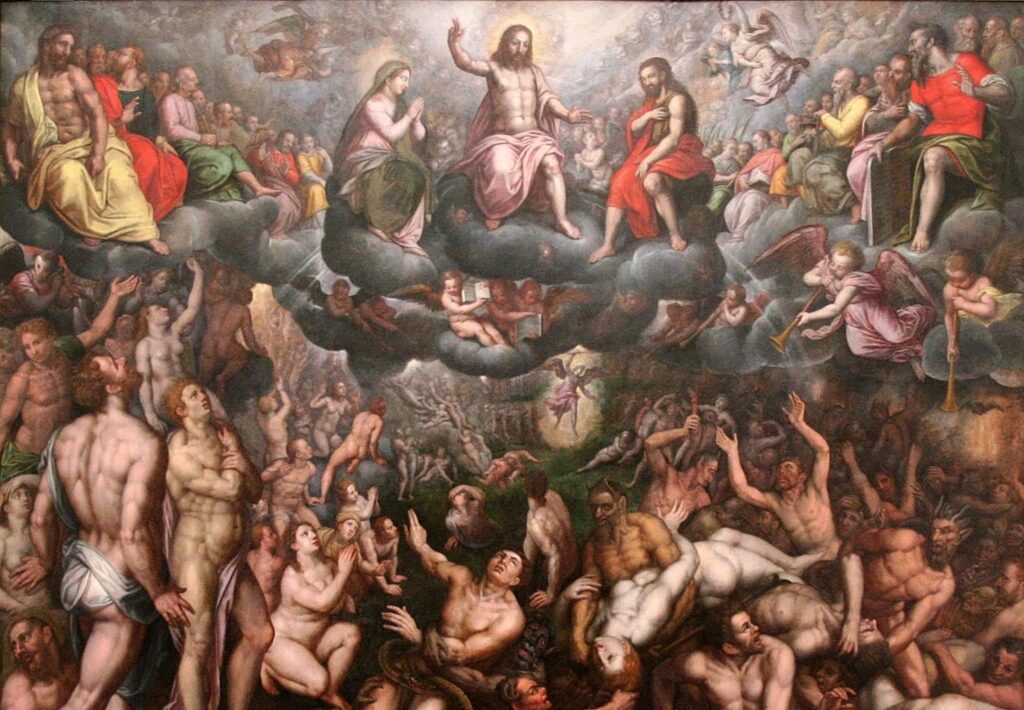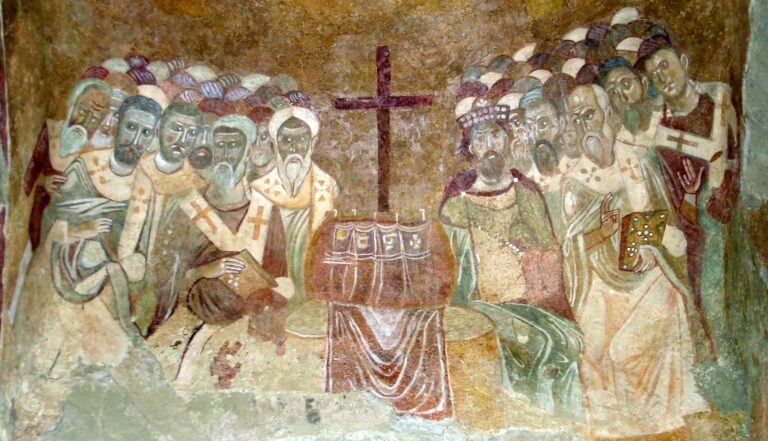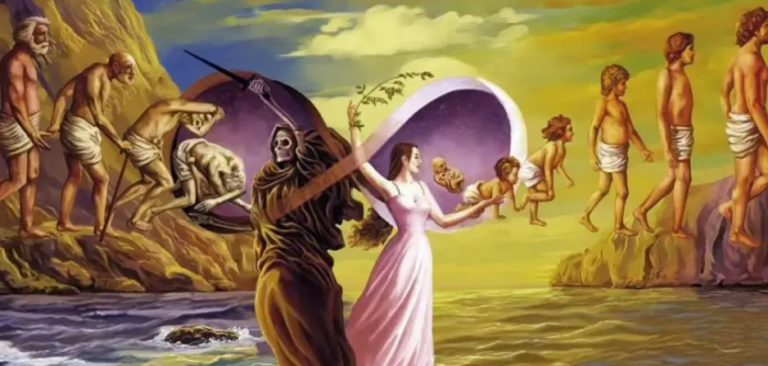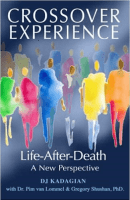Chapter 12.
The Second Coming and the Afterlife

The Second Coming of Jesus Christ is a central Christian belief that entails Jesus reappearing on earth in bodily form and God’s final judgment of everyone who has ever lived. Various interpretations of this future event exist among Christians, but generally they are taught that some of them will be rewarded and others will be punished. Most Christians believe that this final judgment determines who goes to heaven and who goes to hell (for information about these imagined afterlife destinations, see the History of Heaven and Hell chapter).
This chapter contains the following sections:
Note: CE stands for Common Era, which began with the birth of Jesus. The biblical scripture is from the New Revised Standard Version (NRSV).
The Origin and Belief of the Second Coming
The prediction of the Second Coming, which was promulgated by the Apostle Paul (whom I introduce in the Kingpins of Christianity chapter), is contained in 1 Thessalonians and 1 Corinthians of the New Testament. Towards the end of Paul’s life, he was deeply disappointed that Jesus had not reappeared, as were many of his fellow Christians who believed Paul’s prophesy. However, despite the failure of Jesus to reappear, Paul’s prediction persisted. His belief in the Second Coming inspired the authors of the four gospels to write about it. About thirty years after Paul was executed by the Romans, Pope Clement I, in the First Epistle of Clement (ca. CE 95), criticized Christians who had doubts about the Christian faith because the Second Coming had not yet occurred. This criticism demonstrates that the Church was committed to having its followers believe that the Second Coming was real.
When Constantine (whom I also introduce in the Kingpins of Christianity chapter) began his reign as the emperor of Rome in CE 306, the empire was in a state of decline. Then, in CE 312, Constantine converted to Christianity and made Christianity a recognized, legal religion within the Empire. At that time, there was a critical disagreement among Catholic Bishops about the nature of the relationship of Jesus to the Father. Constantine recognized that by having a unified Church, he could more effectively control the population. He assembled about 300 Catholic Bishops from all over the Roman Empire to meet at the city of Nicaea in CE 325 to convene the First Council of Nicaea. The result was the Nicene Creed. This creed incorporated the prediction of the Second Coming, and this prediction is still officially accepted by the Catholic, Orthodox, and major Protestant churches. The original wording, upon which the Second Coming is based, is, “…and the third day he (Jesus) rose again, ascended into heaven; from thence he shall come to judge the quick [that is, the living] and the dead.”
For the almost two thousand years since the Apostle Paul introduced the idea to his followers, the belief in an “imminent” Second Coming has persisted. This is despite the fact that since the year 500 CE, nearly two hundred formal predictions of the exact year and date of the Second Coming have failed. Defying logic, this long history of failed predictions has not deterred Christians from continuing to believe that the Second Coming is bound to happen. According to a 2010 Pew Research report, 41% of Americans believed that Jesus Christ either definitely (23%) or probably (18%) will return to Earth by 2050. The highest percentage in any religious group in the U.S. who believed this are the white evangelical Christians at 58%.
The Last Judgment
The Second Coming of Jesus is conceived of as including God’s final judgment of all people who have ever lived. This is known as the Judgment Day, Day of Judgment, Final Judgment, Day of Reckoning, Doomsday, Day of the Lord, or Day of Resurrection. This was an aspect of the false dogma that the First Council of Nicaea had included in the Nicene Creed. By clinging to this doctrine of a final judgment by God, Christianity has denied the absolute innocence of our souls. Furthermore, the inculcated fear of nonexistent divine judgment distorts believers’ access to the innate human longing to realize the kingdom of God within themselves.
What Does the Bible Reveal about Heaven and Hell?

In anticipation of God’s final judgment, many Christian denominations focus their teachings on what their followers must do to get into heaven and avoid hell. But what does the Bible state about these places? In regards to heaven, the Bible teaches that it is eternal and that God and Jesus are there. Heaven is described as a city built of jewels and gold, with twelve pearl gates (Revelation 21:18-21), but, other than mentioning joy (in Luke 15:7), there is nothing about what happens there. In contrast, the Bible is specific about what happens in hell: Evildoers will be sent to a place “in the lake that burns with fire and sulfer” (Revelation 21:8) or thrown “into the furnace of fire” (Matthew 13:41,42). That’s all there is!

Why are Heaven and Hell Part of Christian Dogma?
Given that Jesus never taught the concepts of heaven and hell, the Christian emphasis on them is absolutely unfounded. Rather than reflecting the teachings of Jesus, the doctrine about heaven and hell is an invented system of reward and punishment that capitalizes on the deep human emotions of fear and hope.
To activate this system, churches teach people that they will spend eternity in either the fires of hell—if they don’t conform to church teachings—or an eternity in heaven—if they do conform. The teachings of heaven and hell are interwoven with other false ideas such as original sin, sin in general, and God as a punisher, which were also incorporated into Christianity as a means of controlling people through fear, guilt, shame, and judgment. But these ideas are travesties. God (as Love) dwells in every person on Earth, without any need for an organization outside of themselves to help them realign with God.
The Christian methodology of reward and punishment is meant to enroll people in its churches and keep them from leaving. Christian churches have set themselves up as the gatekeepers to God and “heaven.” Once enrolled, Christians believe they are dependent on their church for their salvation. Based on false ideas, various Christian denominations have accumulated immeasurable wealth and power.
Christian mechanisms of control are so effective that Christianity has become the largest religion in the world. According to a 2020 Pew Research Center report, there were 2.38 billion members. While Christianity has been declining in the U.S. for decades, its has been gaining elsewhere, particularly in areas such as Africa and South America, where the education levels are much lower than in the U.S.
But the Kingdom of God is Within You
Christianity holds that God the Creator exists wholly apart from his creation. It has anthropomorphized the Creator as a judgmental Being that exists outside of you. This is simply not true and is explicitly contradicted by scripture. Jesus taught that the Kingdom of God, which is the Presence of God (that is Love), is within each person, not in some distant future heaven, but right now—always, forever. This truth is expressed by two New Testament passages that I believe align with Jesus’ teachings:
- Once Jesus was asked by the Pharisees when the kingdom of God was coming, and he answered, “The kingdom of God is not coming with things that can be observed; nor will they say, ‘Look, here it is!’ or ‘There it is!’ For, in fact, the kingdom of God is within you.” (Luke 17:20-21)
- “Do you not know that you are God’s temple and that God’s Spirit dwells in you?” (1 Corinthians 3:16)
Furthermore, 1 John 4:8 says, “…God is love”, and it is your soul, as the essence of love, that leaves your body at physical death. Moreover, according to Ecclesiastes 12:7, “and the dust returns to the earth as it was, and the spirit returns to God who gave it.” I believe this verse is also in accord with Jesus’ teachings.
In overt denial of these Biblical passages, the false teaching that humanity is somehow separate from and judged by God has controlled Christians for two millennia. Christianity has usurped humanity’s fundamental divine birthright by preaching a hierarchical concept of a separate, judgmental God and the “Lord” Jesus, rather than honoring Jesus’ seminal message that “the kingdom of God is within you.”
The Absolute Freedom of the Soul and Reincarnation

God created souls to have inalienable free will. One expression of the gift of free will is that souls are not limited to a single lifetime. Rather, each soul typically lives hundreds, or even thousands, of distinct lives of varied gender in many eras and places. This is achieved through a process known as reincarnation. Reincarnation occurs some time after physical death, when a soul eventually enters a new body. Incarnating on Earth as human beings allows souls to explore their divine gift of free will.
The Christian teaching that the soul only gets one chance at a human life before spending an eternity in either heaven or hell denies the absolute freedom of the soul and is patently false. Biblical scripture shows that, contrary to the Christian dogma of an eternity in heaven (or hell), Jesus taught reincarnation. Souls reincarnate repeatedly in order to explore many facets of the human condition, to feel the full array of human emotions, to learn from their previous choices, and to spiritually evolve. During a wealth of diverse, sometimes harsh, experiences in their many lifetimes, souls develop an increasing capacity to love. They learn both to love themselves and other human beings and to love the beauty and emotional and creative expressions that living on Earth offers. Though this process, all souls will eventually return to God, the Source of Creation, which is Love. Souls return to God, when they fully realign themselves as pure, unconditional, universal love.
Note: For more information about reincarnation in general, see the Reincarnation resource page. For the history of reincarnation in Christianity, see the Reincarnation as Revealed in the Bible chapter.
Contemporary Research on the Afterlife
It is understandable that the original authors of the Bible had little knowledge of the afterlife and the reality of reincarnation. They lived in a time that was very primitive by today’s standards. It was well over a thousand years before the printing press and the Scientific Revolution. Their access to information was dramatically limited compared to today’s age of science and mind-boggling technology, in which billions of people can access current afterlife research with the touch of their fingertips.
Though humans have been contemplating the afterlife for millennia, there had been no research on this topic until the late 1800s. The first organization to formally research the supernatural was The Society for Psychical Research founded in Great Britain in 1882. Nearly 100 years later, afterlife research shifted to the United States, where it is most prevalent.
In the almost century-and-a-half that researchers have been studying the afterlife, there is no evidence whatsoever to support the Christian idea of an eternity in heaven or hell. Rather, dramatic evidence to the contrary has been compiled by afterlife researchers. Here, based on my extensive reading of the paramount research into the afterlife of the soul, I introduce this evidence.
Note: Today, more and more Christians are seeing through that false dogma and are turning to valid perspectives on the afterlife. According to 2021 data released by the Pew Research Center, 30% of Christians in the U.S. believe in reincarnation.
Near-Death Experience: No Judgment for Harmful Behavior
A near-death-experience (NDE) involves an initial, most often very brief, journey of the soul away from its unconscious body. NDEs afford an experience of the non-material nature of reality, the realm of the afterlife. Unlike after physical death, the soul of a person who experiences an NDE (an NDEr) returns to the body, and the person regains consciousness. It has been estimated that 5% of the U.S. population have had an NDE. Some of them have chosen to share their experiences, contributing significantly to anecdotal knowledge of the afterlife.
Formal research into NDEs is relatively new. The term “Near-Death Experience” was coined by Dr. Raymond Moody, Ph.D., who, in 1975, published a ground-breaking book, Life after Life, based on his afterlife research. It sold 13 million copies and was translated into a dozen foreign languages.

More recently, three afterlife researchers (DJ Kadagian; Pim van Lommel, MD; and Gregory Shushan, Ph.D.) summarized their findings from their research into thousands of the most exceptional NDEs ever recorded in Crossover Experience: Life after Death, a New Perspective (2022). They found that the elements of an NDE occur in no particular order, and typically just some of them are experienced during a given NDE. The Crossover Experience authors list them in order of frequency, as follows:
- An overwhelming sense of peace
- Heightened senses
- Time – past, present and future are one
- See deceased loved ones
- Encounter Spiritual Beings
- Have an out-of-body experience
- See or enter a bright light
- Experience otherworldly landscapes and colors
- Enter a tunnel or path
- Heightened understanding
- Reach a border
- Experience a life review
Note: The authors do not list “distressing” NDEs, most likely because they are infrequent.
The Life Review
Among the least likely but most powerful element of NDEs is the life review. You have likely read about or heard about someone who had an NDE say, “I saw my whole life flash before my eyes.” In NDE terminology, this experience is called a “life review.” Afterlife research indicates that soon after physical death a life review is an integral event for every soul. Usually, a soul’s life review is conducted with its spirit guide or other highly evolved guides.
During the review, the soul is able to experience the feelings, both positive and negative, of every person that it affected throughout its lifetime. There is no judgment. However, guides can show the soul what the outcome might have been in a particular situation if the soul had acted in a positive rather than a negative way. The guidance a soul receives in the afterlife is always designed to expand the soul’s capacity to love.
When a life review occurs during an NDE, it is often a life-altering phenomenon. Here, I have chosen a few quotations from some of the people whose NDE life reviews appear in Crossover Experience: Life after Death, a New Perspective:
- “I did find out about the so-called ‘Judgment Day’ I feared so much as a child. We judge ourselves and that it first was a big relief but our life is still our job. …I was shown in living color, like on a movie certain situations, both good and bad, in my life. I was able to see and hear exactly as it was. …I was with a Being made out of the brightest white light I have ever been able to look at without hurting my eyes.” — Glenda H.
- “Through the panoramic life review I had been given the knowledge of how to correct my life, and how to use the power of love to make a difference in the world.” — Mike M.
- ”I was shown incidents in my life where I was very mean to people or hurt people without realizing it due to self-absorption or distraction. …When he showed me all these things he did not condemn me but showed me all of the last moments of love and how it had a domino effect on others. He was so loving in all of this conviction.” — Katie W.
- “I could gauge and feel the impact of my decisions, and how these actions affected other’s lives. There were no feelings of guilt or remorse, only the knowledge that I could have done things differently in some of the situations. There was no blame, no remorse, and no feelings of guilt. …Love is all that I could feel.” — Mike M.
- “I met a glowingly beautiful, very loving being. …I knew that I knew him, and felt completely comfortable and happy. His loving presence completely surrounded me, and together we went through my life and all that I experienced in a loving way, not any judging way.” — L. Bolette
When describing the observations of the life review shared in Crossover Experience, one of the authors, award-winning documentary filmmaker and quantum economist, DJ Kadagian comments:
It is often during their life review that an NDEr experiences a profound revelation. They realize that they didn’t experience negative judgment, even as there were events or actions that were exposed that they were not proud of and were uncomfortable reliving. They did not have the impression that they were there to receive punishment or atone for past sins. There was never a sense that hell awaited them, as we are often taught in organized religion.
Another of the authors, internationally renowned, cardiologist and pioneer NDE researcher Pim van Lommel, M.D. of the Netherlands weighs in:
Because one is connected with the memories, emotions and consciousness of another person, you experience the consequences of your own thoughts, words, and actions to that other person. …The life-review is a learning experience, and that’s it. It’s all about love and helping people. It’s about love, about love, about love, and about love. …You not only know that it’s about love, but also that you are connected to such love.
Christians who are expecting Jesus to physically return to earth to judge the living and the dead will inevitably be disappointed. Jesus never intended to judge anyone, as his love and inclusiveness demonstrated. Rather, each soul experiences the effects of its actions, without judgment, after each lifetime.
Parnia’s Life-Review Elements
Sam Parnia, M.D., Ph.D., is a resuscitation scientist, who is an international leader in near-death experience (NDE) research and a New York Times bestselling author. In his book Lucid Dying (2024), Parnia describes a ground-breaking, scientifically rigorous study that he and his associates conducted internationally. This study, which was reported on in Scientific American, among other publications from around the world, demonstrates that consciousness (the soul) survives the death of the body.
Parnia has compiled a list of elements of the life reviews that frequently occur during NDEs. I strongly recommend reading this list.

Out-of-Body Experience (Astral Projection)

One likely aspect of an NDE is an out-of-body experience (OBE), during which an unplanned, spontaneous journey away from the physical body happens because of an accident or surgical operation. However, in some cases, an OBE, also called an “astral projection,” is a planned experience. Planned OBEs may provide astral travelers with eye-witness perspectives on the afterlife in general and on the interlude before a soul’s next incarnation.
In 1971, Robert (Bob) Monroe, who had learned how to intentionally project his consciousness outside of his body, published Out of the Body, based on his early experience with OBEs.
Bob Monroe is credited with popularizing the term “out-of-body experience”. As Monroe became increasingly proficient at OBEs, he was able to explore the earth plane and also various non-physical realms. What he experienced and learned is quite astounding. Among his discoveries, he was able to meet and observe souls in various stages of their afterlife journeys. In 1974, he founded the Monroe Institute, which helps people to explore non-physical realms to this day.
You can learn more about these adventures in the Out-of-Body Experience resource page. Most highly recommended are books by Robert Monroe and William Buhlman.
Reincarnation: Journey of the Soul
But what about the souls that don’t return to their bodies? When the body dies, consciousness continues to exist within the soul, which continues its cycle of reincarnation. Just as every human on earth is unique, so too is every soul and its journey after physical death. Ultimately, each soul will stop reincarnating to continue its journey in nonmaterial realms. As with NDE research, research on reincarnation is relatively new. It was pioneered by Dr. Ian Stevenson, who was a psychiatrist and professor at the University of Virginia School of Medicine for 50 years. He was the author of approximately three hundred papers and fourteen books on reincarnation. In 1966, he published his first book on the topic, Twenty Cases Suggestive of Reincarnation, one of the first ever on reincarnation research. In 1982, he helped found the Society for Scientific Exploration.
In the Reincarnation resource page, I provide a carefully selected list of books that cover the soul’s journey before, during, and between incarnations. Books by Ian Stevenson, Jim Tucker, Michael Newton, Robert Schwartz, and Brian Weiss are highly recommended.
After-Death Communication Research

In 1988, Bill Guggenheim and Judy Guggenheim created The After Death Communications project to undertake the first in-depth research on after-death communication (ADC) experiences. In 1996, they co-authored Hello from Heaven, the first book ever published on the topic of after-death communication. Their research continues to this day. This book, among others, is listed in the Science-Based Awakening Library on the Death and Dying resource page.
In 2008, Julie Beischel Ph.D. and husband Mark Bocuzzi cofounded the Windbridge Institute, which evolved into Windbridge Research Center. It performs fulltime empirical research with mediums, who are able to communicate with deceased people, and is the world’s leading research organization doing this work. Beischel’s most recent book is Love and the Afterlife. This book, among others, is listed in the Science-Based Awakening Library on the Mediumship resource page.
The Second Coming of Jesus is Here Now
Jesus incarnated on earth to teach people about love and peace. During these past decades, he has been quite actively teaching again, this time as a spiritual being who is writing and speaking through human channels, and he continues to teach and assist humanity to this day. Resources that reveal his true teachings are in the Discover Jesus without Dogma chapter.

